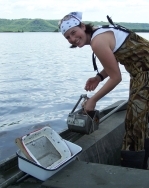Education:
- Ph.D. in Zoology, University of Otago, New Zealand, 2011
- M.S. in Biology, Minnesota State University, Mankato, 2007
- B.S. in Biology, University of Minnesota, Twin Cities, 2002
Courses:
- BIOL 3353 Ecology and Evolution (Fall and Spring, periodically)
- BIOL 3449 Invertebrate Zoology (Spring)
- BIOL 4320 Behavioral Ecology (Fall, even years)
- BIOL 4430 Ornithology (Spring and Summer)
- BIOL 4445 Parasitology (Fall)
- BIOL 4398 Current Topics in Life Sciences (Writing Intensive; Fall and Spring, periodically)
- BIOL 5380 Biological Scientific Writing (Spring)
- BIOL 5086 Disease Ecology (Fall, periodically)
Research Interests:

I have a well-established interest in the trematode-host interaction and ask research questions on evolutionary ecology. I have a well-established interest in the trematode-host interaction and ask research questions on evolutionary ecology. My first research focus involves the ability of parasites to impact community structure of an ecosystem by changing the outcome of competitive or exploitative interactions between host species and other species within communities. By affecting ecological interactions, parasites have a key role in the community structure of ecosystems. The effects of a parasite on an ecosystem can be complicated if a parasite is introduced to a community by an invasive host species, resulting in other potential host species in that community interacting with a new parasite. Previous work on a novel parasite-host interaction has also lead to an interest in local adaptation in hosts. Host species commonly exhibit local adaptation of life history traits in locations with long-term, high infection rates, possibly resulting in resistance, earlier age of first reproduction or switching mode of reproduction. Further, I am particularly interested in exploring anti-parasite behavior of host species. How do some individuals avoid parasitism?
My second major research area encompasses the mechanisms that drive the evolution of parasite life history traits, including host specificity, development, fecundity, transmission pathways and host manipulation. Trematodes typically have a complex life cycle with multiple hosts and life stages. Each transmission event is a challenge because hosts are patchily distributed in both time and space. Trematodes have responded to these selective pressures resulting in various adaptations, including high fecundity, asexual reproduction, efficient host-finding mechanisms and long-lived larval stages. Many trematode species even have the ability to alter host behavior or morphology to increase the probability of being transmitted to the next host, usually exploiting predator-prey relationships in host species. Other trematode species are capable of eliminating a host and shortening their life cycle.
I use field studies, experiments and molecular techniques to investigate parasite communities, local adaptation, host specificity, life cycles and ecological factors related to transmission. Currently, I am particularly interested in exploring the evolutionary ecology of the parasite-host systems found in the local aquatic systems around Stephenville and involving undergraduate and graduate students in both field and laboratory research. Fieldwork typically consists of collecting host organisms and transporting them to the lab. Laboratory research includes a large amount time working at a dissecting scope, dissecting hosts and collecting, measuring, preserving and identifying species of parasites. Some projects also include molecular techniques such as DNA extraction and PCR.
